Bay City approves $400,000 package to launch Good Samaritan drop‑in center for people experiencing homelessness
Get AI-powered insights, summaries, and transcripts
Subscribe
Summary
The Bay City Commission voted 7–2 to authorize $250,000 in CDBG capital funds and $150,000 in marijuana-tax revenue for a Good Samaritan Rescue Mission drop‑in center aimed at “hard‑to‑reach” people. Supporters said the model connects people to services; some commissioners and residents urged broader, multi‑jurisdictional planning.
The Bay City Commission on Tuesday voted to authorize start‑up funding for an overnight drop‑in center operated by Good Samaritan Rescue Mission, approving a $250,000 capital allocation from Community Development Block Grant (CDBG) funds and $150,000 from the city’s marijuana tax revenue for one year of operations.
The vote on a commission resolution to support the proposal passed 7–2 after more than an hour of questions from commissioners and public comment about scope, costs and whether surrounding jurisdictions should share funding.
The proposal calls for Good Samaritan to renovate roughly 2,000–2,500 square feet in the southern part of its building, creating a simple drop‑in area with up to 35 places where people can come each night from 8 p.m. to 8 a.m. The center would not provide sleeping rooms but would offer a safe, warm place, meals, laundry and connections to case management, medical outreach and housing providers. The only stated rules would be no weapons and no drugs on site.
“This is a lifeline,” Commissioner Hilliker said during debate, arguing the site is intended to reach people who will not come into a traditional shelter and to provide a consistent place where providers can find and engage them. Commissioner Prince, who supported the measure, said the city’s marijuana tax revenues have grown and can fund pilot operations while staff seeks longer‑term support.
Presenter Dan Streeter of Rescue Ministries of Mid Michigan told commissioners the model is based on similar drop‑in centers in Lansing and Detroit. Streeter said the Lansing site sees 60–80 people per night, and Good Samaritan’s plan assumes 25–35 visitors nightly. He said the drop‑in center would allow outreach workers to find and stabilize people, increasing successful housing exits. Streeter said renovation cost estimates were provided by a local contractor and that, if approved, the project could complete city approvals and construction work in roughly 120–150 days, placing service start in May or June.
Commissioners pressed for operational detail: how the center would track guests, privacy protections and partnerships. Good Samaritan said it uses the Homeless Management Information System (HMIS) for clients who consent to data collection and plans regular visits by Bay Area Behavioral Health and medical outreach teams. Commissioner Tenney asked whether the center would accept people with criminal convictions; Streeter replied the drop‑in area would be secured and separated from the rest of the mission and intended to serve single adults, while families with children would be directed to shelter spaces better suited for children.
Several residents and service providers urged support in public comment. Face Addiction Now, Pier 360 and other local outreach workers told the commission they frequently lack immediate places to send people who want treatment and that a low‑barrier site could bridge that gap. Other residents asked the city to seek county and regional partners because many people using the mission’s services live outside Bay City.
Commissioners who voted against the resolution, Commissioner Coakley and Commissioner Bernie Overshaw, said they were concerned about committing marijuana tax dollars already assigned to road projects and wanted more time to explore alternative, longer‑term facilities.
The resolution requires Good Samaritan to provide regular reporting on operations and finances; earlier amendments added reporting requirements asking for a financial report detailing use of public funds, an operational performance review (numbers served, services provided and outcomes) and community feedback on accessibility. City CDBG staff said the capital allocation requires a substantial amendment to annual action plans and a 30‑day public comment posting before HUD is notified; staff said such amendments are commonly approved if regulations and public‑notice requirements are met.
Votes at a glance: the commission approved the Good Samaritan resolution 7–2 (Yes: Prince, Tenney, Hilliker, DeWitt, Bloomberg, Charlebois, Morris; No: Coakley, Overshaw). The meeting also adopted other routine and administrative items, including amendments to the city’s responsible contracting rules and designation of a dock contractor (both adopted by roll call), and a separate resolution requiring biannual ARPA spending reports (adopted). A separate resolution to relist historical YouTube meeting videos was added to the agenda and later referred to staff for legal review.
The newly funded drop‑in center is a city‑supported pilot that officials said will be monitored and adjusted as outcomes and funding options develop.
